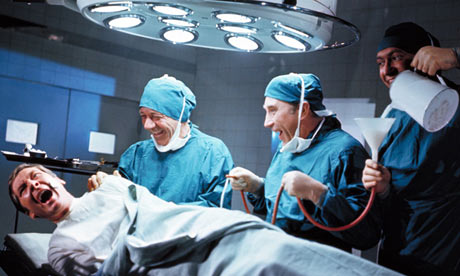From a doctor amputating the wrong leg, to a woman given the wrong baby, hospital treatment does not always go to plan. Luckily, though, mistakes are rare

One unhappy patient … Kenneth Williams in the 1967 film Carry on Doctor. Photograph: ITV/Rex Features
It sounds like a classic nightmare – waking up during an operation to find you can't move. But that's what happened to one patient, Sarah Newton. "I was trying to scream. I tried to wiggle my toes desperately hard but I couldn't move anything." Thankfully, "accidental awareness", as it is known, is rare. A survey from the Royal College of Anaesthetists says it occurs once in every 15,000 operations under general anaesthetic, or 153 times in 2011 – and is usually brief and painless. But what of our other medical terrors?
Wrong site surgery
Usually the cause is a catastrophic series of administrative errors, such as when Dr Rolando Sanchez, a Florida surgeon, was told by a nurse that he was amputating the wrong leg of his patient just as he finished cutting through it. Luckily, with only 70 incidents recorded by the NHS in the year 2011-12, it is extremely unusual.
Wrong patient surgery
Never mind the wrong limb. How about operating on the wrong body? Sometimes there may be a mix-up over two people with the same name. Or similar procedures. The reality may not be as scary as it sounds – recently a patient in Cambridgeshire was given another patient's lens during eye surgery, although this was soon corrected. Plus there were fewer than 10 incidents reported in the UK during 2011-2.
Retained instruments
Leaving surgical instruments inside patients occurred 161 times in 2011-12. Often it's a sponge, which can lead to serious infections. The risk arises in emergency surgery, and in surgery on obese patients, but it is still very unlikely to happen to you.
Baby mix-ups
Despite being a common storyline in films or stories, there are few documented cases of mothers sent home with the wrong baby. But you have to ask: how would they know? In Romania in 2008, Cristina Zahariuc noticed because the daughter she was sent home with turned out to have a penis. Despite a few awful stories, the risk will be lower now that most babies stay with their parents immediately after birth.
Being treated by an impostor
Well, it has happened. In September 2011, 17-year-old Matthew Scheidt was convicted, of impersonating a physician's assistant in Florida. He dressed wounds, attended surgery, examined naked patients and even administered CPR. While New Zealander Richmal Oates-Whitehead treated victims of the 7 July 2005 bombings in London, despite not being medically qualified.
Ferdinand Waldo Demara managed fairly well when he conducted a series of major operations by speed-reading textbooks during the Korean war. And a man called Gerald Barnes even managed to impersonate a doctor, and be convicted of it, five times. Thankfully pretenders do tend to get caught.
No comments:
Post a Comment